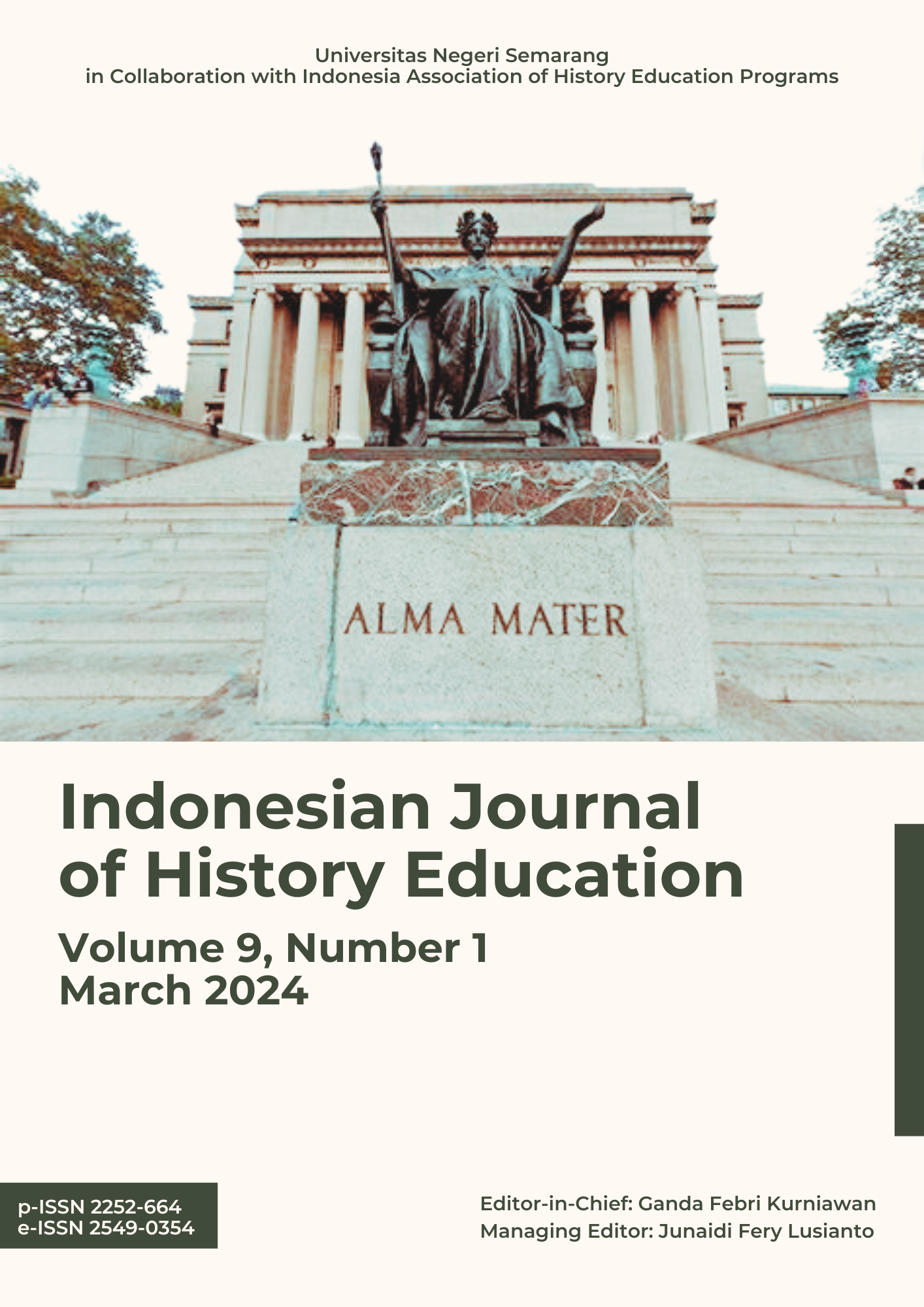Tolerance in Minahasan Local Knowledge
An Alternative to History Teaching
Abstract
Discrimination can manifest in numerous ways. At its core, intolerance can have devastating consequences, including dehumanizing people and making them feel insignificant or inferior, leading to social exclusion and violence. Discrimination has the potential to have a devastating impact on mental health, especially in immigrant communities. Analyzing written transcripts, field notes, and recorded conversations yields themes and insights from qualitative research. Interviews are used by data collection techniques to collect information from participants regarding their experiences or opinions on specific topics. Some members were dissatisfied with its independence from Dutch-established churches, while others desired to incorporate traditional beliefs. These debates remain central to the development of Christian identity in Minahasa today. Although religion and tradition are frequently intertwined, many villagers believe that preserving their religious heritage is essential to preserving their sense of identity; however, this has proven more difficult as Protestant churches have been less accommodating of cultural practices in their services.
References
Arntsen, H., & Waldrop, A. (2018). Introduction to Special Issue: Qualitative Method/ologies in Development Studies. Forum for Development Studies, 45(2), 185–189. https://doi.org/10.1080/08039410.2018.1468408
Balint, P. (2016). The importance of racial tolerance for anti-racism. Ethnic and Racial Studies, 39(1), 16–32. https://doi.org/10.1080/01419870.2016.1099713
Bilgili, N. Ç. (2015). Religiosity and tolerance in Turkey: Is Islam the problem? Southeast European and Black Sea Studies, 15(4), 473–494. https://doi.org/10.1080/14683857.2015.1063794
Cavallaro, C. J., Sembiante, S. F., Kervin, C., & Baxley, T. P. (2019). Combating Racial Inequity Through Local Historical Analysis: A Community-Informed Social Studies Unit. The Social Studies, 110(1), 17–32. https://doi.org/10.1080/00377996.2018.1524361
Clough, T. (2021). Rutland Local History & Record Society. Midland History, 46(3), 339–340. https://doi.org/10.1080/0047729X.2021.1975236
Crowley, F., & Walsh, E. (2021). Tolerance, social capital, and life satisfaction: A multilevel model from transition countries in the European Union. Review of Social Economy, 1–28. https://doi.org/10.1080/00346764.2021.1957994
Crowley, R. M. (2018). Preserving Local History With Public Value in Mind. Theory & Research in Social Education, 46(1), 149–154. https://doi.org/10.1080/00933104.2017.1380445
Denlinger, A. C. (2020). The Aberdeen Doctors (c.1620–1641) on tolerable and intolerable tolerance. Global Intellectual History, 5(2), 137–151. https://doi.org/10.1080/23801883.2019.1699875
Ernst, J. S. (2024). Historical content in the social work curriculum: The value of local history. Social Work Education, 43(1), 174–185. https://doi.org/10.1080/02615479.2022.2098944
Fan-sen, W. (2022). “The unstable layer of Confucian culture”—Several thoughts on “modern local history.” Chinese Studies in History, 55(3), 177–196. https://doi.org/10.1080/00094633.2022.2122464
Federman, C. (2023). Nazis in Skokie: Tolerance, democracy, and the deliberative sense of the community. Communication and Democracy, 57(1), 52–70. https://doi.org/10.1080/27671127.2023.2206463
García-Alonso, M. (2019). Tolerance and religious pluralism in Bayle. History of European Ideas, 45(6), 803–816. https://doi.org/10.1080/01916599.2019.1616312
Gellera, G. (2020a). Christian tolerance and tolerance of the Christians: Natural law and conscience in James Dundas’s Idea Philosophiae Moralis (1679). Global Intellectual History, 5(2), 171–190. https://doi.org/10.1080/23801883.2019.1699886
Gellera, G. (2020b). Christian tolerance and tolerance of the Christians: Natural law and conscience in James Dundas’s Idea Philosophiae Moralis (1679). Global Intellectual History, 5(2), 171–190. https://doi.org/10.1080/23801883.2019.1699886
Handojo, V., Yuspendi, & Sisemore, T. A. (2023). Attachment style, religiosity, and well-being among Indonesian Christians. Journal of Prevention & Intervention in the Community, 51(1), 58–72. https://doi.org/10.1080/10852352.2021.1924597
Kara-Murza, A. A. (2015). Berdyaev’s Moscow: A Philosophical Investigation of Local History. Russian Studies in Philosophy, 53(4), 338–351. https://doi.org/10.1080/10611967.2015.1123062
Luddy, M. (2020). English Local History: An Introduction. Family & Community History, 23(3), 222–235. https://doi.org/10.1080/14631180.2021.1889185
Mareta, Y., Rukmana, L., & Yaldi, D. (2023). Cultural Penetration: Post-Modern Threat to Historical Learning. Cultural Penetration: Post-Modern Threat to Historical Learning. Indonesian Journal of History Education, 8(1), 23–32.
Maurer, C., & Gellera, G. (2020). Contexts of religious tolerance: New perspectives from early modern Britain and beyond. Global Intellectual History, 5(2), 125–136. https://doi.org/10.1080/23801883.2019.1699869
Polidoro, P. (2015). Using Qualitative Methods to Analyze Online Catalog Interfaces. Cataloging & Classification Quarterly, 53(3–4), 314–330. https://doi.org/10.1080/01639374.2015.1013235
Simanullang, P. (2023). The Impact of Colonial Thinking Legacy on the Production of Knowledge about the Fine Arts in Southeast Asia. Indonesian Journal of History Education, 8(1), 33–44.
Stewart, D.-L. (2022). Performing goodness in qualitative research methods. International Journal of Qualitative Studies in Education, 35(1), 58–70. https://doi.org/10.1080/09518398.2021.1962560
Verkuyten, M., Yogeeswaran, K., & Adelman, L. (2023). The social psychology of intergroup tolerance and intolerance. European Review of Social Psychology, 34(1), 1–43. https://doi.org/10.1080/10463283.2022.2091326
Copyright (c) 2024 IJHE

This work is licensed under a Creative Commons Attribution 4.0 International License.
Copyright Notice
An author who publishes in the Jurnal Indonesian Journal of History Education agrees to the following terms:
- Author retains the copyright and grants the journal the right of first publication of the work simultaneously licensed under the Creative Commons Attribution-ShareAlike 4.0 License that allows others to share the work with an acknowledgement of the work's authorship and initial publication in this journal
- Author is able to enter into separate, additional contractual arrangements for the non-exclusive distribution of the journal's published version of the work (e.g., post it to an institutional repository or publish it in a book) with the acknowledgement of its initial publication in this journal.
- Author is permitted and encouraged to post his/her work online (e.g., in institutional repositories or on their website) prior to and during the submission process, as it can lead to productive exchanges, as well as earlier and greater citation of the published work (See The Effect of Open Access).
Read more about the Creative Commons Attribution-ShareAlike 4.0 Licence here: https://creativecommons.org/licenses/by-sa/4.0/.




